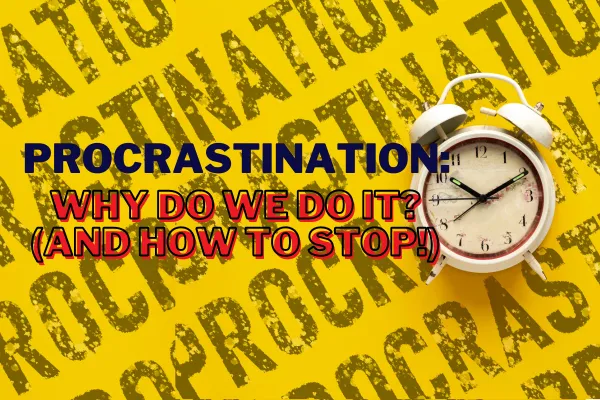
Featured Blog

We've all experienced it—the overwhelming feeling of staring down a looming deadline, with tasks piling up before us. Procrastination, the thief of time, often seems like an insurmountable hurdle. But it doesn't have to control us. It's time to reclaim our autonomy, to break free from the cycle of delay and distraction.
To conquer procrastination, we must first embrace the power of deadlines and prioritization. By focusing on what truly matters, we can witness our productivity soar.
Overcoming Procrastination
Overcoming Procrastination: Unlocking Productivity To conquer procrastination, we must first embrace the power of deadlines and prioritization. By focusing on what truly matters, we unlock the key to soaring productivity.
1. Start Small Begin by setting clear, achievable goals with realistic timelines. Break them down into smaller tasks and tackle them one step at a time.
2. Master Time Management Banish procrastination by mastering the art of time management. Utilize tools like schedules, timers, and to-do lists to create a system that propels you forward.
3. Eliminate Distractions Turn off notifications, find a quiet space, and create a conducive environment for work. Establish routines and stick to them to unleash your full potential and sidestep the pitfalls of procrastination.
4. Practice the 2-Minute Rule If a task takes less than two minutes to complete, do it immediately rather than postponing it. By tackling small tasks promptly, you prevent them from accumulating and becoming overwhelming.
5. Create a Structured Schedule Establish a daily or weekly schedule that includes dedicated time slots for work, breaks, and leisure. Use tools like calendars, planners, or productivity apps to organize your tasks and commitments. Stick to your schedule consistently to build momentum and discipline.
Utilizing Time Management Techniques.
Adopt time management methods like the Pomodoro Technique, set deadlines for tasks, and use time-tracking tools to monitor your progress. By implementing these keys and creating a systematic approach to overcome procrastination, you can unlock your full potential, increase productivity, and achieve success in your endeavors.
Hold yourself accountable by sharing your goals with a trusted friend, mentor, or colleague who can provide support and encouragement. Reward yourself for meeting milestones or completing tasks to reinforce positive behavior. Remember, overcoming procrastination is not about perfection but progress. Embrace these keys, implement tangible strategies, and watch as you unlock the doors to chief success and productivity.

Creating a Culture of Psychological Safety
"Psychological safety is not a personality difference but rather a feature of the workplace that leaders can and must help create."
- Amy Edmondson
Hello Leaders,

As April is National Stress Awareness Month, I'd like to cover the importance of cultivating a culture of psychological safety as this is a way to manage and relieve stress in our work environments.
Understanding the Effects of Stress in the Workplace
Stress in the workplace is a prevalent issue that can have profound effects on both individuals and organizations.
Common effects of workplace stress include decreased productivity, increased absenteeism, strained relationships among team members, and negative impacts on mental and physical health.
It's essential to recognize that stress not only affects individual employees but also has broader implications for the overall functioning and success of the organization.
Cultivating a Culture of Psychological Safety
This is why I feel Psychological safety is fundamental in any workplace. It's about creating an environment where individuals feel safe to voice concerns, share ideas, and take risks without fear of repercussions or negative consequences.
Research has shown that organizations with high levels of psychological safety experience greater employee engagement, innovation, and overall performance.
Fostering trust, and a supportive This isn't just about feeling good—it's about cultivating a culture that fosters trust, collaboration, and innovation. It is a culture that values constructive feedback. Psychological safety enables individuals to contribute fully to their teams and organizations.
Key characteristics include open communication channels, respect for diverse perspectives, supportive leadership, and an atmosphere where all voices are valued and respected.
Strategies to Cultivate Psychological Safety
Leadership Commitment: Leadership plays a critical role in creating and maintaining psychological safety. Leaders must demonstrate a commitment to transparency, empathy, and vulnerability. Continuous improvement in this area is essential. Develop action plans and sustain progress through ongoing dialogue and collaboration.
Open Communication: Encourage open and honest communication at all levels of the organization. Provide opportunities for employees to voice their opinions, ideas, and concerns without fear of judgment or retribution.
Promote Inclusivity: Embrace diversity and inclusivity within the workplace. Ensure that all employees feel valued, respected, and included, regardless of their background or perspective. Schedule team-building activities promote trust and respect among team members. The goal is to create a safe-space that is supportive, where each individual feels heard and validated.
Foster Feedback Culture: Create an environment where feedback is welcomed and constructive criticism is seen as an opportunity for growth. Conduct surveys or assessments to gather qualitative data to identify areas for improving your team or organization's psychological safety culture. Encourage regular feedback exchanges between team members and between employees and leadership.
Lead by Example: Leaders should lead by example by actively listening to employees, acknowledging their contributions, and admitting mistakes when necessary. Use recognition and celebrate success or wins to reinforce a positive culture. Long-term sustainability requires integrating psychological safety initiatives into strategic planning and providing ongoing support.
Stress in the workplace is a significant issue that can have detrimental effects on individuals and organizations. However, by cultivating a culture of psychological safety, we can help manage and relieve stress while fostering a more engaged, innovative, and productive workforce. Let's commit to implementing these strategies and creating environments where all employees feel valued, respected, and supported.
Wishing you an amazing day and a stress - free week!



